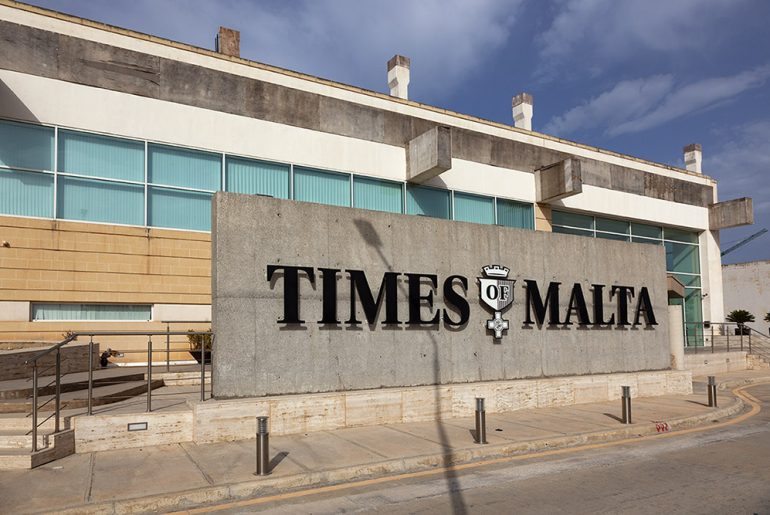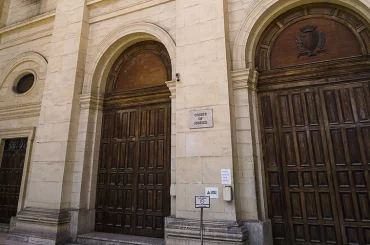Multiple employees of Allied Newspapers who spoke on condition of anonymity have expressed discontentment at Michel Rizzo’s return to the office. Rizzo is undergoing proceedings in court for fraud and money laundering. He remains a director of Progress Press and Allied Newspapers, and returned to work at Allied’s offices a few months ago after initially “suspending himself” upon arraignment last April.
Allied Newspapers are publishers of The Times and The Sunday Times.
The employees wondered if they would have been treated the same if they had been charged in court on similar charges, particularly in view of the Disciplinary Code of Practice (Guidelines) in the collective agreement. The employees also claimed that officials had told them to make his return to the office smooth.

The court case is over a grant of more than €1 million given to Progress Press (a company of Allied Newspapers) by Malta Enterprise.
Rizzo “suspended himself” from managing director upon arraignment, a self-suspension that the chairperson of Allied’s board of directors, Paul Mercieca, called “exemplary.” He added that Rizzo “continues to apply this self-imposed sanction” and is now working in a “non-executive capacity.”
Mercieca then justified Rizzo’s return to the office on the strength of a decree by the Court of Magistrates as a Court of Criminal Inquiry, which he said “declared” that Rizzo “has no case to answer in his personal capacity” and that the ongoing case is “against the company.”
A legal source described Mercieca’s reasoning or distinction as an attempt to split hairs.
In the decree, the court held that although there was sufficient evidence for an indictment to be filed against Rizzo, this was so only insofar as the charges related to his capacity as an official of Progress Press but not insofar as the charges referred to anything he had done and failed to do in his personal capacity.
Yet whether Rizzo is prosecuted in his capacity as director or in his personal capacity is of little practical difference for the offences he is charged with under the criminal code, particularly fraud and false declaration. If Rizzo is found guilty in his capacity as director, it’s Rizzo the person who will be convicted, not Progress Press. Under provisions of criminal code in the criminal court, you cannot charge a company, you can only charge people.

Police’s answer adds to confusion
Asked why only two officials of Progress Press were charged, a police spokesperson had said: “Kindly note that that case is sub-judice and therefore we cannot comment on ongoing court procedures.”
It is unclear how or why it is subiudice – which means undergoing proceedings in court – given that the question was about those who have not been charged, not those who are undergoing proceedings.
A provision in the Interpretation Act reads: “Where an offence against the provisions of this Act is committed by a body of persons, whether corporate or unincorporate, every person who, at the time of the commission of the offence, was a director, manager, secretary or other similar officer of such body or association, or was purporting to act in any such capacity, shall be guilty of that offence unless he proves that the offence was committed without his knowledge and that he exercised all due diligence to prevent the commission of the offence.”
This same provision in the Interpretation Act is found in a range of other laws, including the Prevention of Money Laundering Act.
This means that in terms of the Criminal Code and the Prevention of Money Laundering Act, when any offence is committed by a company, then everyone in the post of director, manager, secretary or other similar post in the company is potentially liable to be arraigned in court in respect of the offence committed by the company.
Each of those officials would have to individually convince the police (during the investigation) or the court (during court proceedings) that they had no knowledge of the offence, and made a positive effort to set up systems within the company to prevent the commission of the offence by the company. After all, a company cannot do or fail to do anything amounting to a criminal offence unless some physical person does or omits to do something. The manager, director, secretary and other similar officer are thus held vicariously liable for the offence committed by the company.
If the police are satisfied, in the course of investigations, that the offence is committed by the company without the knowledge of the manager of that company, and, moreover, that the manager had exercised all due diligence to prevent the commission of that offence, then they would not press charges.
In the case under examination, the police charged the managing director Michel Rizzo as well as financial controller Claude Licari with various offences, including fraud, money laundering, and false declarations. They were charged in their capacity as company officials as well as in their personal capacity.
Then, in a decree delivered on 28 May 2021, the magistrate Dr Natasha Galea Sciberras held that there was a “total absence of proof” that Rizzo and Licari had benefitted personally from any of the alleged crimes.
Sciberras decreed that a bill of indictment in respect of Licari could be filed in respect of his role as an official of Progress Press, and in his personal capacity only insofar as breaches of accountancy-related obligations in law. As for Rizzo, the bill of indictment would have to be limited to his role as an official of Progress Press.
Legal sources who spoke to this website questioned whether the magistrate ought to have made that distinction at that stage, given that it was simply – in legal jargon or concept – a decree of the prima facie. In a decree of this type, the practice is that at the end of the compilation of evidence, even if one of the charges is found to subsist or hold, the magistrate’s role would be to decree, or lay down, that a bill of indictment can be filed, without pronouncing himself or herself on whether any of the charges be left out of the bill of indictment.
Questions mount
Another question is why did the police charge Rizzo and Licari in their personal capacity – aside from their capacity as company officials – when it ought to have been clear that they did not benefit personally?
A further question is why have none of the other officials of Progress Press been charged? And could they still be charged?
The clock of extinctive prescription is of course ticking.
The law says that every “director, manager, secretary or other similar officer” would have had to convince the police that each had “no knowledge” of the offence and that each “exercised all due diligence to prevent the commission of the offence” – the law puts the burden to prove these exculpatory facts on these company officials. That is a cardinal principle of vicarious liability in criminal law.
Did all these officials convince the police that they had “no knowledge” of the offence and that each “exercised all due diligence to prevent the commission of the offence”?
Other officials could still be charged provided that the time-term has not run its course in line with the statute of limitations.
The timespan given by the prosecution in its charges (as reproduced in the decree of 28 May 2021) ranged from 2013 to 13 March 2019. It is not known whether the police or prosecution have altered or narrowed those dates – the records of criminal proceedings are not open to public viewing – or if this would be relevant to the statute of limitations. Of note is that one of the charges, fraud – Article 308 of the Criminal Code – expires after 10 years in the statute of limitations.
What is sure is that the police’s answer to the question of why they did not charge other officials – “that the case is sub-judice and therefore we cannot comment on ongoing court procedures” – is a non-answer that offers no clarity.





